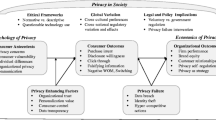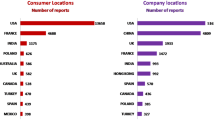Abstract
As consumer use of information and communication technology (ICT) products grows, the importance of ICT standards in consumer markets also grows. While standards for manufactured products were once developed at the national level in formal standards bodies, standards for ICT products today are more likely to be developed by informal standards bodies that target global markets, creating new challenges for national consumer protection laws. As part of the process of creating a single market, the EU developed an innovative and successful form of “coregulation” known as the “New Approach” that coordinated the work of legislators and standards developers to reduce technical barriers to trade in the internal market. In order to protect consumer interests in markets for ICT products effectively, another “New Approach” is needed to coordinate the work of global ICT standard-developing organizations with the goals of national and regional consumer protection laws, but the institutional challenges facing such a strategy are daunting. The French DADVSI legislation represents progress in this direction; further progress may be possible by adopting “better regulation” strategies.
Similar content being viewed by others
Notes
A list of thousands of standards consortia can be found at http://www.consortiuminfo.org, a Web site maintained by Andrew Updegrove.
The European Union standards bodies are the European Committee for Standardization (CEN), the European Committee for Electrotechnical Standardization (CENELEC), and the European Telecommunication Standards Institute (ETSI).
Loi no. 2006-961 du 1er août 2006 relative au Droit d’Auteur et aux Droits Voisins dans la Société de l’Information; parue au JO no. 178 du 3 août 2006, page 11529.
The WIPO Copyright Treaty (WCT) and the WIPO Performances and Phonograms Treaty (WPPT) adopted in Geneva on December 20, 1996.
Directive 2001/29/EC of the European Parliament and of the Council of 22 May 2001 on the harmonization of certain aspects of copyright and related rights in the information society.
Conseil de la Concurrence, Décision 04-D-54 du 9 novembre 2004.
References
ANEC (2006). Position paper on the revision of the New Approach. Brussels: European Association for the Co-ordination of Consumer Representation in Standardization. ANEC-GA-2006-G-036.
BERR (2008). Consultation on legislative options to address illicit peer-to-peer (P2P) file-sharing. London: Department for Business Enterprise and Regulatory Reform. Retrieved from http://www.berr.gov.uk/files/file47139.pdf.
BEUC (2004). Digital rights management. Brussels: European Consumers’ Association. BEUC/X/025/2004.
Breyer, S. (1982). Regulation and its reform. Cambridge, MA: Harvard University Press.
Cargill, C. (2001). The informal versus the formal standards development process: myth and reality. In S. M. Spivak, & F. C. Brenner (Eds.), Standardization essentials: Principles and practice (pp. 257–265). New York: Marcel Dekker.
CEC (2001). European governance: a white paper. Brussels: Commission of the European Communities. COM(2001) 428 final.
CEC (2004). High level group on digital rights management: final report. Brussels: Commission of the European Communities.
CEC (2007). European electronic communications regulation and markets 2006 (12th report). Brussels: Commission of the European Communities. COM(2007) 155.
Cheit, R. (1990). Setting safety standards: regulation in the public and private sectors. Berkeley, CA: University of California Press.
CONTU (National Commission on New Technology Uses of Copyrighted Works) (1978). Final report of the National Commission on New Technological Uses of Copyrighted Works. Washington, DC: Library of Congress.
Dixon, R. (1978). Standards development in the private sector: thoughts on interest representation and procedural fairness. Boston: National Fire Protection Association.
Egan, M. (2001). Constructing a European market: standards, regulation, and governance. Oxford: Oxford University Press.
Egan, M. (2002). Setting standards: strategic advantage in international trade. Business Strategy Review, 13(1), 51–64.
Gasser, U., & Palfrey, J. (2007). Breaking down digital barriers: when and how ICT interoperability drives innovation. Cambridge, MA: Harvard University. Berkman Center Research Publication 2007-8.
Gowers, A. (2006). Gowers review of intellectual property. London: The Stationery Office.
Guibault, L. (2002). Copyright limitations and contracts—an analysis of the contractual overridability of limitations. Hague: Kluwer Law International.
Hilton, M. (2003). Consumerism in 20th century Britain: the search for a historical movement. Cambridge: Cambridge University Press.
Hodges, C. (2007). Encouraging enterprise and rebalancing risk: implications of economic policy for regulation, enforcement and compensation. European Business Law Review, 18, 1231–1266.
Jondet, N. (2006). La France v. Apple: who’s the DADVSI in DRMs? SCRIPT-ed, 3, 473–484.
Jondet, N. (2007). DRM watchdog established in France (Décret no. 2007-510 du 4 avril 2007) French-law.net. Retrieved April 11, 2007, from http://french-law.net/drm-watchdog-established-in-france-decret-2007-510-4-avril-2007.html.
Kirton, J., & Trebilcock, M. (2004). Introduction: hard choices and soft law in sustainable global governance. In J. Kirton, & M. Trebilcock (Eds.), Hard choices, soft law: Voluntary standards in global trade, environment, and social governance (pp. 3–29). Aldershot: Ashgate.
Krislov, S. (1997). How nations choose product standards and standards change nations. Pittsburgh, PA: University of Pittsburgh Press.
Lessig, L. (1999). Code and other laws of cyberspace. New York: Basic Books.
Mathis, J. (2006). The WTO agreement on technical barriers to trade. Consumer Policy Review, 16, 14–21.
McGee, A., & Weatherill, S. (1990). The evolution of the single market: harmonization or liberalisation. Modern Law Review, 53, 578–596.
Miller, A. (1995). Environmental regulation, technological innovation, and technology-forcing. National Resources and Environment, 10, 64–69.
Morgan, B., & Yeung, K. (2007). An introduction to law and regulation: text and materials. Cambridge: Cambridge University Press.
Ogus, A. (1995). Rethinking self-regulation. Oxford Journal of Legal Studies, 15, 97–108.
Parker, C., & Braithwaite, J. (2005). Regulation. In P. Cane, & M. Tushnet (Eds.), Oxford handbook of legal studies (pp. 119–145). New York: Oxford University Press.
Pelkmans, J. (1987). The new approach to technical harmonization and standardization. Journal of Common Market Studies, 25, 249–270.
Schepel, H. (2005). The constitution of private governance: product standards in the regulation of integrating markets. Oxford: Hart.
Sénat (2006). Rapport n° 308 (2005–2006) de M. Michel Thiollière, fait au nom de la commission des affaires culturelles, déposé le 12 avril 2006.
Teubner, G. (1987). Juridification of social spheres: a comparative analysis in the areas of labor, corporate, antitrust and social welfare law. Berlin: Walter de Gruyter.
US Census Bureau (2007). Extended measures of well-being: living conditions in the United States, 2003. Washington, DC: Department of Commerce. Retrieved from http://www.census.gov/prod/2007pubs/p70-110.pdf.
Van Eecke, P., & Truyens, M. (2009). Standardisation in the European ICT sector: official procedures at the verge of being overhauled. Shidler Journal for Law, Commerce and Technology, 5, 3. In press.
Varian, H., Farrell, J., & Shapiro, C. (2004). The economics of information technology: an introduction. Cambridge, UK: Cambridge University Press.
Weatherill, S. (2007). The challenge of better regulation. In S. Weatherill (Ed.), Better regulation (pp. 1–16). Oxford: Hart.
Weitzner, D. (2002). Testimony before the United States Department of Justice and United States Federal Trade Commission Joint Hearings on Competition and Intellectual Property Law and Policy in the Knowledge-Based Economy. Washington, DC: Federal Trade Commission, Retrieved from http://www.ftc.gov/opp/intellect/020418weitzner.shtm.
Whitman, J. (2007). Consumerism versus producerism: a study in comparative law. Yale Law Journal, 117, 340–406.
Winn, J. K. (2006). US and EU regulatory competition and authentication standards in electronic commerce. Journal of IT Standards and Standardization Research, 5(1), 84–102.
Winn, J. K. (2008a). Standard developing as a form of self-regulation. In S. Bolin (Ed.), Standardization: Unifier or divider. United States: Bolin Communications. In press.
Winn, J. K. (2008b). What protection do consumers require in the information economy. In J. Gunning (Ed.), Law, Ethics & Society(vol. IV). Aldershot: Ashgate. In press.
Winn, J. K., & Wright, B. (2008). Law of electronic commerce (4th ed.). New York: Aspen.
Author information
Authors and Affiliations
Corresponding author
Rights and permissions
About this article
Cite this article
Winn, J., Jondet, N. A “New Approach” to Standards and Consumer Protection. J Consum Policy 31, 459–472 (2008). https://doi.org/10.1007/s10603-008-9086-1
Received:
Accepted:
Published:
Issue Date:
DOI: https://doi.org/10.1007/s10603-008-9086-1




